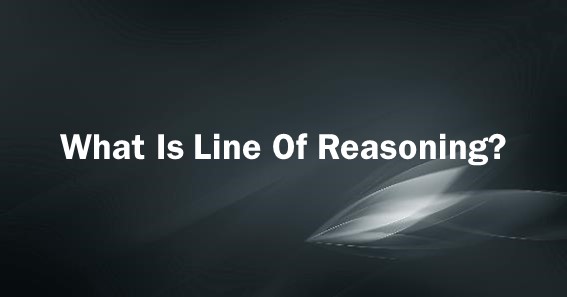Are you curious to know what is line of reasoning? You have come to the right place as I am going to tell you everything about line of reasoning in a very simple explanation. Without further discussion let’s begin to know what is line of reasoning?
In the realm of critical thinking and persuasive communication, the line of reasoning plays a vital role. It is a powerful tool that helps individuals construct logical and coherent arguments, enabling them to present their ideas effectively and engage in meaningful discussions. If you’re interested in understanding the concept of the line of reasoning and how it contributes to sound reasoning, this blog post is for you. We’ll explore what the line of reasoning is, its components, and the benefits it offers in enhancing your critical thinking skills.
What Is Line Of Reasoning?
The line of reasoning refers to the logical progression of thoughts, ideas, and evidence in an argument or discussion. It is the foundation upon which a persuasive case is built, guiding the audience from premises to conclusions in a clear and logical manner. A well-structured line of reasoning helps to support claims, establish credibility, and convince others of the validity of a particular position.
Components Of The Line Of Reasoning:
- Premises: Premises are the starting points or supporting statements that serve as the foundation of an argument. They provide evidence, facts, or reasons that support the overall claim or conclusion.
- Inferences: Inferences are the logical connections or conclusions drawn from the premises. They bridge the gap between the supporting evidence and the final claim, showcasing the logical progression of thoughts.
- Warrants: Warrants are the underlying assumptions or principles that connect the premises to the conclusion. They provide the logical justification for why the premises support the claim.
- Backing: Backing refers to additional evidence or information that supports the warrants and strengthens the line of reasoning. It provides further credibility and reinforces the logical connections within the argument.
Benefits Of The Line Of Reasoning:
- Clarity and Coherence: A well-developed line of reasoning ensures that arguments are clear, coherent, and easy to follow. It helps to organize thoughts and ideas in a logical sequence, allowing the audience to understand the progression of the argument.
- Persuasiveness: A strong line of reasoning enhances the persuasive power of an argument. By presenting a logical and well-supported case, it increases the likelihood of convincing others and gaining their agreement or support.
- Critical Thinking: The line of reasoning is an essential tool in critical thinking. It encourages individuals to evaluate evidence, analyze the logical connections between premises and conclusions, and identify any weaknesses or fallacies in the argument.
- Effective Communication: By employing a clear and well-structured line of reasoning, individuals can effectively communicate their ideas and viewpoints. It helps to engage the audience, promote understanding, and foster productive discussions.
Tips For Developing A Strong Line Of Reasoning:
- Identify the Claim: Start by clearly articulating the main claim or conclusion you want to support. This will serve as the guiding point for developing your line of reasoning.
- Gather Supporting Evidence: Collect relevant evidence, facts, or reasons that support your claim. Ensure that the evidence is credible, reliable, and directly related to the argument.
- Establish Logical Connections: Identify the logical connections between the premises, inferences, warrants, and backing. Ensure that each step in the line of reasoning logically follows from the previous one.
- Anticipate Counterarguments: Consider potential counterarguments or objections to your claim and address them within your line of reasoning. Anticipating opposing viewpoints strengthens your argument and demonstrates a comprehensive understanding of the topic.
To Figure Out Such Kind Things On Shortestt
Conclusion:
The line of reasoning is a powerful tool that aids critical thinking and effective communication. By understanding its components and incorporating it into your arguments, you can construct logical and persuasive cases that engage others and promote thoughtful discussions. Developing a strong line of reasoning requires careful analysis, evidence-based reasoning, and clear logical connections. By honing this skill, you can enhance your critical thinking abilities and present compelling arguments in various areas of life.
FAQ
What Is An Example Of A Line Of Reasoning?
You should choose a cat over a dog. That’s the line of reasoning. It’s a line because the premise leads directly to the conclusion. Of course, the validity of the conclusion depends on the creator’s understanding of the audience.
How Do You Identify An Author’s Line Of Reasoning?
Another way to think of a line of reasoning is that it is an author’s train of thought, the arrangement of his ideas. Often, we can identify a writer’s overall claim early in the passage, then use the rest of the content to strengthen the overall claim by making support the claims.
How Does A Line Of Reasoning Relate To A Thesis Statement?
A thesis statement may preview the line of reasoning of an argument. This is not to say that a thesis statement must list the points of an argument, aspects to be analyzed, or specific evidence to be used in an argument.
What Are 5 Examples Of Reasoning?
There are five methods of inductive reasoning: example, cause, sign, comparison, and authority.
I Have Covered All The Following Queries And Topics In The Above Article
What Is Line Of Reasoning
What Is The Line Of Reasoning
What Is A Line Of Reasoning Ap Lang
What Is Line Of Reasoning Ap Lang
What Is Line Of Reasoning Ap Seminar
What Is A Line Of Reasoning In Ap Lang
What Is Line Of Reasoning In Ap Lang
Line Of Reasoning Example
Why Is Line Of Reasoning Important
How To Write A Line Of Reasoning
How To Identify Line Of Reasoning
Line Of Reasoning Rhetorical Analysis
Line Of Reasoning Ap Lit
Line Of Reasoning Definition And Example
Line Of Reasoning In An Essay
What Is Line Of Reasoning
What is an example of line of reasoning
What is a line of reasoning example
